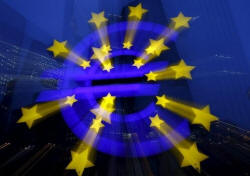|
 ECB
cuts rates, increases assets buys more than expected ECB
cuts rates, increases assets buys more than expected
 Send a link to a friend
Send a link to a friend
[March 10, 2016]
By Balazs Koranyi and Francesco Canepa
FRANKFURT (Reuters) - The European Central
Bank cut all three of its interest rates and expanded its asset-buying
program on Thursday, delivering a bigger-than-expected cocktail of
actions to boost the economy and stop ultra low inflation becoming
entrenched.
|
|
 The ECB cuts its deposit rate deeper into negative territory,
charging banks more for parking their cash, and increased monthly
asset buys to 80 billion euros from 60 billion euros, exceeding
expectations for an increase to 70 billion. The ECB cuts its deposit rate deeper into negative territory,
charging banks more for parking their cash, and increased monthly
asset buys to 80 billion euros from 60 billion euros, exceeding
expectations for an increase to 70 billion.
Surprising markets, it cut its main refinancing rate to zero from
0.05 percent. The euro fell around 1 percent against the dollar.
Hoping to boost lending, consumption and inflation, the ECB said it
would also start buying corporate debt and would also launch four
new rounds of cheap loan packages, to be extended by banks to the
real economy.
The ECB has little to show for the 700 billion euros it has spent
buying government bonds and other assets in the past year, as
tumbling raw materials prices blunt the impact of its quantitative
easing.

That raises the risk that people will lose faith in the bank's
commitment to its mandate. Inflation has been below the ECB's nearly
2 percent target for three years and is likely to remain so for many
more.
The ECB cuts its deposit rate to -0.4 percent from -0.3 percent, in
line with expectations, but it also surprised markets by cutting its
other two interest rates.
As well as the refinancing rate, which means banks can now borrow at
its weekly auctions at no cost, it cut the marginal lending rate,
used by banks to borrow from the ECB overnight, to 0.25 percent from
0.3 percent.
[to top of second column] |

Attention now turns to ECB President Mario Draghi's 1330 GMT press
conference, where he will comment on the decisions and unveil the
bank's fresh inflation and growth forecasts.
Although inflation expectations have fallen sharply in recent months
on lower crude oil prices, Europe's growth prospects have held up
relatively well as domestic consumption is proving resilient to a
slowdown in emerging markets.
Weak business and industrial sentiment indicators have however
suggested that Europe is facing increasing headwinds, particularly
from slowing growth in China.
(Editing by Jermey Gaunt)
[© 2016 Thomson Reuters. All rights
reserved.] Copyright 2016 Reuters. All rights reserved. This material may not be published,
broadcast, rewritten or redistributed.
 |